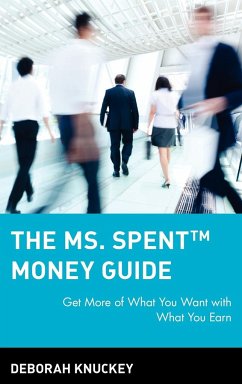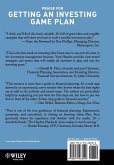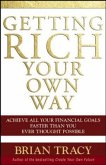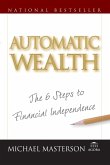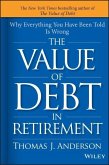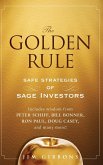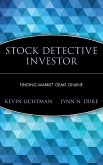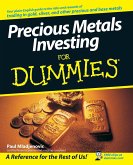"The Ms. Spent Money Guide" - Der individuelle Geldwegweiser. Hier erfahren Sie, wie Sie sich für ihr hart verdientes Geld mehr leisten können. Die Autorin präsentiert den innovativen Ansatz "Conscious Spending", mit dem auch Sie lernen, vernünftig zu wirtschaften. Dieses Modell hilft Ihnen, Ihre Einkaufsgewohnheiten umzustellen, ohne das Gefühl zu haben, auf etwas verzichten zu müssen. Sie lernen, Ihre Ausgaben und Bedürfnisse aufeinander abzustimmen und Prioritäten zu setzen. Die Autorin gehört der amerikanischen Trainings- und Schulungseinrichtung Choice Performance an und bietet landesweit TV-Kurse, Präsentationen und Trainerschulungen zu diesem Thema an.
Hinweis: Dieser Artikel kann nur an eine deutsche Lieferadresse ausgeliefert werden.
Hinweis: Dieser Artikel kann nur an eine deutsche Lieferadresse ausgeliefert werden.
There's no "right" way to spend, says Knuckey, a personal finance consultant who calls her system "coaching" not "counseling," since "you may never understand the details" of your feelings about money, but "you can still change your behavior." Happily, her behavior modification plan involves no penny-pinching, few rules and not much of that "b-word"(budgeting), which is about as much fun as dieting. The bottom line to Knuckey's system is her focus on "Conscious Spending," which means only buying what really makes you happy. While there are the obligatory passages on the trap of escalating wants and the ball-and-chain of debt, her main message is positive: focus on satisfying yourself, and you'll never lack motivation. Apart from such truisms, there are occasional mentions of more radical notions, like the idea that having enough is a very real concept for people who have come to the end of their "journey of self-expression." Knuckey's program is basically sensible and unthreatening, low on "shoulds" and sprinkled with humor. Her own persona] lifetime spending program, for instance, assumes "that I will die broke" - why support lazy heirs? And, she advises, don't play the lottery: "if you want to buy hope, buy a drink at a singles bar!" By the end of the book, a complex budgeting plan sneaks in anyway, but readers who've gotten that tar won't mind.
Forecast: While there's no dearth of personal finance self-help books on the market, Knuckey's down-to-earth tone should appeal to 20-somethings, especially considering her online presence, detailed in the book's final pages.
--Publisher's Weekly
In The Ms. Spent Money Guide, Deborah Knuckey wants everyone to be a conscious spender.
You know, someone who never buys things spontaneously and never purchases things they never use. (The kind of sensible person, in short, who is the opposite of the heroine in the funny best-selling novel, Confessions of a Shopaholic.)
No one makes you spend money, but experts spend a lot of time and money making it hard to resist. "Advertiser' and marketers' success depends on their ability to link their products with your wants, and increase the volume until you can make a purchase. Think you can pit your self-will against their sophisticated marketing? It's tough," she writes.
The way around this pressure: Be aware of what triggers you to spend so freely. That, of course, is a lot easier said than done. But she does have exercises to put you into a less lavish frame of mind. One exercise: Take 5 minutes to write down all the influences that put you into a shopping mode - when did you first hear of the product? Did friends or colleagues egg you on? Do you know someone who has something similar - are you keeping up with the Joneses? The problem with conscious spending is that it requires a delicate balance of today's wants and tomorrow's needs. Knuckey says it can be painless by following her spending model. This hierarchy places the soul at the top of the pyramid. The soul category encompasses travel, vacation home, cable, books, music, hobbies, sports, massages, manicures and jewelry, among other things. After that come expenses for things like food, shelter.
Security is the foundation of the pyramid, which includes insurance, retirement planning, emergency expense funds and debt management. A strong security base means you're less vulnerable to unexpected circumstances, such as illness, divorce, unemployment or business failure. Of course there is a hitch. Under this plan, you have to fulfill the security foundation before you can float to the top - and then buy the fun stuff.--Juliette Fairley, Special for USA TODAY, April 23, 2001
Forecast: While there's no dearth of personal finance self-help books on the market, Knuckey's down-to-earth tone should appeal to 20-somethings, especially considering her online presence, detailed in the book's final pages.
--Publisher's Weekly
In The Ms. Spent Money Guide, Deborah Knuckey wants everyone to be a conscious spender.
You know, someone who never buys things spontaneously and never purchases things they never use. (The kind of sensible person, in short, who is the opposite of the heroine in the funny best-selling novel, Confessions of a Shopaholic.)
No one makes you spend money, but experts spend a lot of time and money making it hard to resist. "Advertiser' and marketers' success depends on their ability to link their products with your wants, and increase the volume until you can make a purchase. Think you can pit your self-will against their sophisticated marketing? It's tough," she writes.
The way around this pressure: Be aware of what triggers you to spend so freely. That, of course, is a lot easier said than done. But she does have exercises to put you into a less lavish frame of mind. One exercise: Take 5 minutes to write down all the influences that put you into a shopping mode - when did you first hear of the product? Did friends or colleagues egg you on? Do you know someone who has something similar - are you keeping up with the Joneses? The problem with conscious spending is that it requires a delicate balance of today's wants and tomorrow's needs. Knuckey says it can be painless by following her spending model. This hierarchy places the soul at the top of the pyramid. The soul category encompasses travel, vacation home, cable, books, music, hobbies, sports, massages, manicures and jewelry, among other things. After that come expenses for things like food, shelter.
Security is the foundation of the pyramid, which includes insurance, retirement planning, emergency expense funds and debt management. A strong security base means you're less vulnerable to unexpected circumstances, such as illness, divorce, unemployment or business failure. Of course there is a hitch. Under this plan, you have to fulfill the security foundation before you can float to the top - and then buy the fun stuff.--Juliette Fairley, Special for USA TODAY, April 23, 2001

